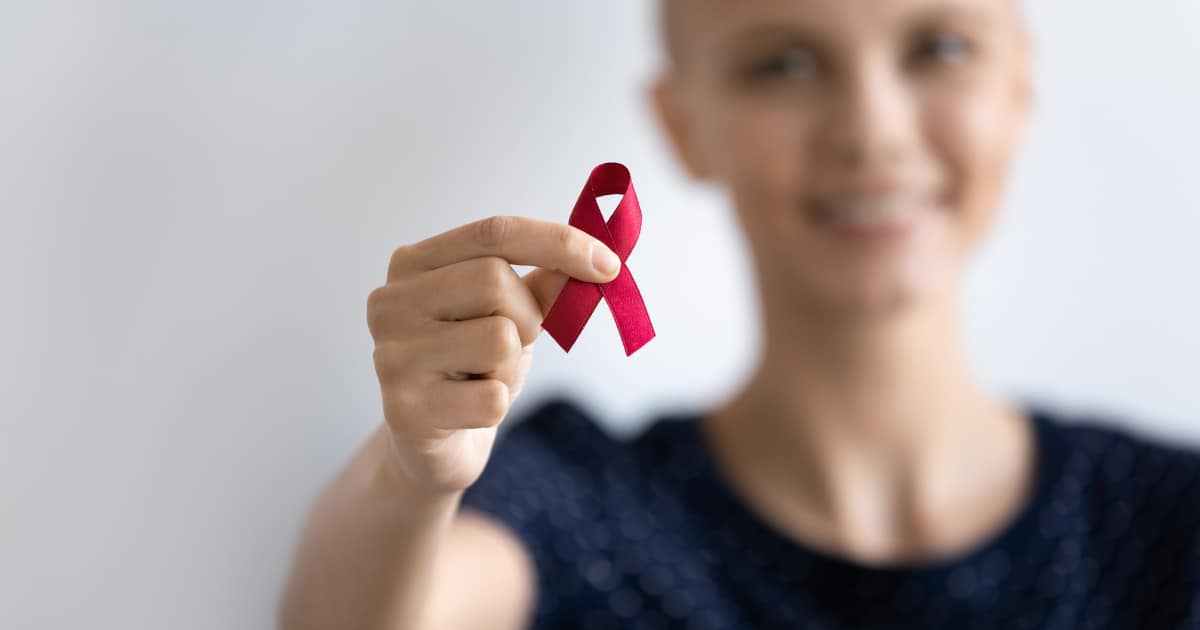Unfortunately, your risk of developing cancer as a person with diabetes is higher than for those without diabetes — especially if you’re a woman.
As if people with diabetes don’t have enough to worry about, research on high blood sugar levels and cancer risk continues to demonstrate a clear link between the two.
In this article, we’ll look at why diabetes increases your risk of developing cancer, what types of cancer people with diabetes are most likely to develop, if diabetes medications increase your risk, and what risk factors you can manage.

Why having diabetes increases your risk of developing cancer
The short answer is simple: excess glucose in your bloodstream creates a variety of problems in how your body functions. Some of those problems you’re already very familiar with, such as retinopathy, neuropathy, nephropathy, yeast infections, etc.
While cancer isn’t considered a “complication” of having diabetes, it has certainly proven in research to benefit from an environment where inflammation and blood glucose levels are higher than normal.
One theory is that persistently high blood glucose levels actually damage your DNA and cells throughout your entire body. Cancer originates when cells become damaged and reproduce, and higher blood sugar levels may increase both the damage and the rate of growth of damaged cells that have become cancerous.
The Dana Farber Cancer Institute (DFCI) adds that the link between cancer and diabetes is still largely a mystery, but there are many theories.
“The researchers suggested that the link between the two diseases may be partly due to shared risk factors, including aging, overweight and obesity, diet, physical activity, alcohol, and smoking.”
The DFCI adds that excess sugar in the blood, insulin resistance, higher levels of insulin, and abnormal amounts of insulin-like growth factor-1 (IGF-1), and higher levels of inflammation could all play a role in the metabolic abnormalities that might increase the development and growth of cancer.
Higher risk for specific types of cancer
A 2010 report published by the American Diabetes Association (ADA) found that patients with type 2 diabetes were twice as likely to develop cancers of the liver, pancreas, and endometrium (lining of the uterus).
It also found a notable but lesser link between diabetes and cancer in the colon, rectum, breasts, and bladder.
On the flip side, men with diabetes have a lower risk of developing prostate cancer.
Cancer risk is higher in women
A 2016 report published by Diabetologia also concluded that women with diabetes have a higher risk of cancer than men with diabetes.
Compared to non-diabetic women, women with diabetes have a 27 percent higher risk of cancer.
Men with diabetes face a 19 percent higher risk of cancer compared to their non-diabetic counterparts.
A consistent theory as to why women pose a higher cancer risk than men is because they are often diagnosed (and treated) at least two years later than men, which means they were living with higher blood sugar levels for a greater length of time.
The second theory is that treatment and medication plans for women with diabetes are less aggressive compared to how men are treated, which means blood sugar levels in women are again higher for a greater length of time.
A 2015 study published by the ADA also found that women were less likely to adhere to their medication plan compared to men. Again, this means their overall blood sugar levels are higher for a greater length of time, creating more cell damage and inflammation.
Do diabetes medications increase your risk of cancer?
This is a hotly debated issue and one without any clear conclusions.
The ADA’s 2010 consensus report looked closely at the different medications used to treat diabetes and their impact on a patient’s risk of developing cancer.
Metformin
Metformin, for example, actually demonstrated in a variety of studies to actually reduce a patient’s risk of cancer. One study even suggested that metformin may “selectively kill” cancer stem cells, and actually improve the efficacy of a patient’s breast cancer treatment.
Studies on metformin and cancer have also suggested that it reduces a patient’s cancer-related risk of death and improves their overall cancer prognosis.
Research on metformin’s positive impact on breast cancer treatment continues, due to the promising results thus far.
Sulfonylureas
This class of drug includes brand names Glipizide and Glimiperide. In small studies, patients taking this type of diabetes medication had an increased risk of cancer or cancer-related death compared to patients taking other diabetes medications.
The results were still seen as inconclusive because other medications include metformin. This means the study couldn’t determine whether patients had a higher risk of cancer or death because they were taking sulfonylureas, or because they were not taking metformin.
With metformin’s evidence of reducing cancer risk and improving cancer treatment outcomes, it’s nearly impossible to differentiate how other diabetes medications compare without better control over these variables.
GLP-1 Receptor Agonists
This class of medication has been growing in popularity due to its ability to help patients lose weight, in addition to improving their blood sugar control. Brands include Trulicity, Ozempic, Victoza, Rybelsus, and Bydureon.
At first glance, it seems concerning that the FDA has added a “Black Box Warning” to most of the agents in this class. The manufacturers are required to say that there is a potential risk of thyroid tumors including medullary thyroid cancer.
Even for medullary thyroid cancer, however, most endocrinologists DO NOT consider this to be a real risk in humans, according to Dr. David Ahn, MD, Program Director of the Mary & Dick Allen Diabetes Center.
This is because the concern was only seen in mice/rat studies and has NOT been demonstrated in human data, despite this class of medication being introduced in 2005.
Insulin
While there are have been numerous studies and skepticism about manufactured insulin and cancer, no study has ever demonstrated conclusive evidence that it increases a patient’s risk of cancer.
Insulin glargine, for example, was once under the spotlight for potentially increasing a patient’s risk of cancer, but the research did not support the theory. To date, no solid evidence has been found to suggest that manufactured insulin causes cancer.
Risk factors for cancer that you cannot control
Diabetes aside, your race, gender, and age are all factors that affect a person’s risk of developing cancer that you simply cannot change, according to the ADA’s 2010 consensus report.
Your race – African Americans have the highest cancer diagnosis rates as well as the highest cancer mortality rates.
Your gender – Overall, men (diabetic and non-diabetic combined) have a higher risk of developing cancer than women.
Your age – 78 percent of all new cancer diagnoses are in people age 55 or older.
Risk factors for cancer that you can manage
Your body mass index (BMI), if you smoke, your diet and exercise habits, and how often you drink are all significant risk factors for developing cancer that you can do something about.
Your BMI
A BMI greater than 25 has proven to increase a person’s risk of cancer. The ideal BMI is between 18.5 to 25.
Using tobacco
Tobacco use has been identified as the cause of 71 percent of all deaths from cancer trachea, bronchus, and lungs. (Smoking, by the way, also significantly increases your risk of developing type 2 diabetes!)
What you eat
It shouldn’t come as a surprise that a diet consisting of mostly whole foods — fruits, vegetables, and lean sources of protein — are associated with a lower risk of cancer. This doesn’t mean you’re expected to eat a 100 percent perfect diet, but aiming for a diet that is at least 80 percent healthy choices is always a good idea.
How active you are
Getting regular activity (exercise) has proven to reduce your risk of certain cancers and altogether prevent prostate and lung cancer. And of course, it’s a critical part of diabetes management!
How much alcohol you drink
Drinking alcohol regularly — even in reasonable amounts — increases your risk of cancer, including breast cancer in women.
How you manage your diabetes
Last, but not least, the way you manage your diabetes is one of the most valuable opportunities you have to reduce your risk of developing cancer. It can feel overwhelming when you’re faced with persistently high blood sugar levels.
Trying to improve your diet or exercise more can feel like an impossible challenge if it’s something you’ve been struggling with for years or decades.
Take the pressure off by first working with your doctor to get your blood sugars down with the help of medications, and then start tackling your habits that can help decrease insulin resistance and lower your blood sugar levels. The first and most important part is getting your blood sugar levels down into a healthy range.
A cancer diagnosis is an overwhelming moment in anyone’s life. For a person already facing the challenges of living with diabetes, it can be terrifying. By taking charge of the factors you can manage in your life, you can significantly reduce your risk of cancer while also improving your overall diabetes health. Don’t wait. Start today.





Walter
Very helpful and informative information from Diabetes Strong. Have been a type 1 diabetic for 37 years and bought one of the first self testing glucometers on the market. People would say why did you spend so much money and I would say it’s like driving a car without a gas gauge you never know how full the tank is and when it is almost empty.
I still use my glucometer along with my dexcom G6 to make decisions on my treatment.
I find this website very helpful and sometimes more informative and up-to-date than my endocrinologist!
Thanks for all your informative postings.